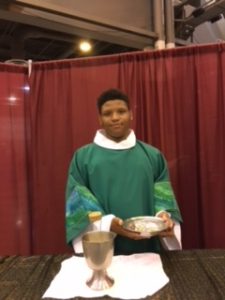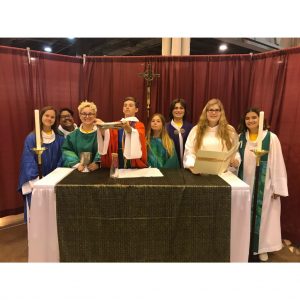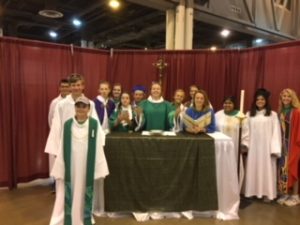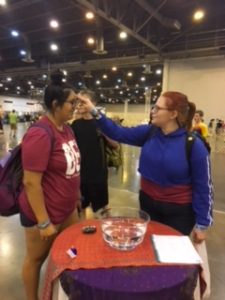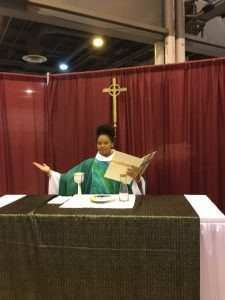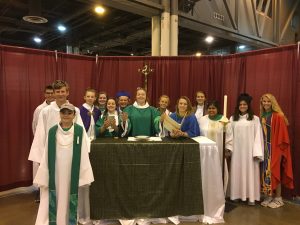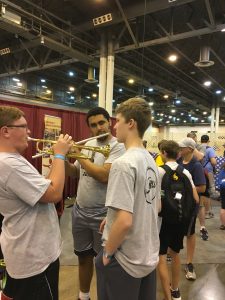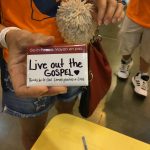ELCA Advocacy Office, Washington, D.C.
The Rev. Amy Reumann, director ELCA.org/advocacy
ELCAvotes:In the lead up to Election Day on November 6th, this coming “God’s work. Our hands.” Sunday on Sept. 9, will feature ELCAvotes advocacy resources to use during the day of service.This year’s resources will focus on voting rights, including a background resource guide and a template letter to Congress supporting the Voting Rights Advancement Act. 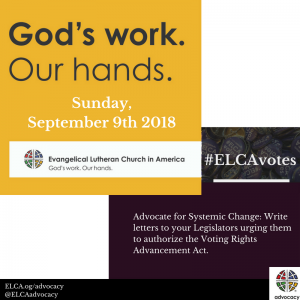
ELCAvotes is a non-partisan initiative to expand the role of the church in encouraging voter participation. Updated congregational resources, Lutheran Bible studies, factsheets and civic participation guides are online at ELCA.org/votes. More ELCAvotes resources, such as interfaith webinars, blogs and social media toolkits, will be released over the summer and fall. Be sure to sign up to ELCAvotes to be the first to receive new resources!
FARM BILL UPDATE: In late July, the House of Representatives voted to conference with the Senate on the 2018 farm bill. Many of our nation’s most critical food and farm policies depend on the renewal of the farm bill, impacting people from rural America to developing countries. Among the differences between the House and Senate bills that need to be addressed are conservation programs and the Supplemental Nutrition Assistance Program (SNAP).
As House lawmakers head to their home districts for August recess, now is a critical time to reach out to legislators in support of compassionate, comprehensive policies that religious leaders have long supported. Find out how you can coordinate action with your lawmakers while they are in town with the ELCA In-District Guide. ELCA Advocacy will share an updated action alert in support of a comprehensive, bipartisan farm bill in August. Stay up to date with the farm bill through ELCAadvocacy blogs.
PREVENTION OF GENOCIDES AND ATROCITIES: On July 17, the House passed the Elie Wiesel Genocide and Atrocities Prevention Act. If signed into law, it would recognize preventing genocide and other atrocities as a core national security interest and moral responsibility. ELCA Advocacy and ecumenical partners are major supporters of the bill and its focus on atrocities worldwide.
As currently written, the act would help coordinate U.S. efforts to prevent global atrocities from occurring and also introduce prevention training for foreign service officers. It would also require the president to update Congress on efforts taken to minimize violence in countries at risk and provide global assessments of instability, conflict and atrocities. Lutherans are encouraged to share their opinion on the bill, and ELCA Advocacy will share an action alert with more information on it in the coming weeks.
CLIMATE CHANGE AND JUST TRANSITION: Ruth Ivory Moore, ELCA Advocacy’s Director for Environment and Corporate Social Responsibility, is leading a committee in planning a Talanoa Dialogue on “ just transition” and “loss and damage” as an affiliate event of the Global Climate Action Summit in September. The planning committee includes the Pacific Lutheran Theological Seminary of California Lutheran University, the Lutheran World Federation, ACT Alliance, Brot für die Welt, Lutherans Restoring Creation, and the Lutheran Office of Public Policy-California. The Talanoa Dialogue brings together faith-based organizations to produce a submission for the consideration of the UNFCCC Secretariat on how to reach zero carbon and resilient economies without leaving stranded employees and communities. The submission will also address the plight of millions of people facing unprecedented humanitarian crises due to environmental degradation resulting in devastating losses for which no means of adequate compensation exists.
Lutheran Office for World Community, United Nations, New York, N.Y.
Dennis Frado, director
FORUM DISCUSSES “SUSTAINABLE AND RESILIENT SOCIETIES”: In 2012, the U.N. High-Level Political Forum on Sustainable Development (HLPF) was mandated by the Conference on Sustainable Development. This year’s HLPF met July 9-18 with the theme “Transformation towards sustainable and resilient societies,” reviewing progress made toward the Sustainable Development Goals (SDGs).
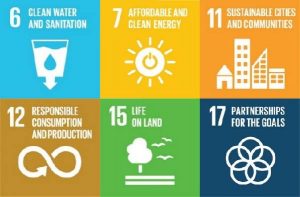
This year’s conference included 25 meetings, more than 250 side events and 46 voluntary national reviews attended by more than 2,200 participants. Read the closing remarks of Marie Chatardová, president of the U.N. Economic and Social Council, here; those delivered by U.N. Secretary-General António Guterres may be read here.
On July 16, the U.N. Population Fund, in collaboration with U.N. faith-based partners, including The Lutheran World Federation and ACT Alliance, offered the HLPF side event “Strengthening Resilience Through Faith-Based Partnership: Women and Girls’ Health in the Context of SDG 11.”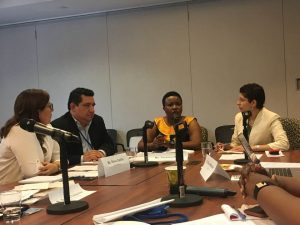
Faustina Nillan Manyangu, national director for women and children in the Evangelical Lutheran Church in Tanzania, was a panelist. Her work focuses on vulnerable groups of women and children who are marginalized and susceptible within the church and the community at large.
CONSENSUS REACHED ON MIGRATION COMPACT: The final intergovernmental negotiations for the draft Global Compact for Safe, Orderly and Regular Migration were concluded on July 13 by consensus, with formal adoption of the compact slated for December in Marrakech, Morocco. A joint civil-society statement at the conclusion of the negotiations highlighted some of the significant achievements:
- working to end child detention;
- expanding regular avenues for migration and measures for regularization as a way to increase safe, orderly, and regular migration and reduce vulnerabilities;
- emphasizing community-based alternatives to detention and not promoting detention as a deterrent to irregular migration;
- protecting migrants in situations of vulnerability, including those fleeing slow and sudden natural disasters, the adverse effects of climate change and environmental degradation;
- safeguarding the rights of children by adhering to the principle of the best interest of the child at all times and ensuring their protection and access to sustainable solutions;
- ensuring decent work and labor rights;
- promoting concrete gender-responsive policies and the empowerment of women as agents rather than from the lens of victims;
- guaranteeing due process, individual assessment and effective remedy in return procedures by upholding the prohibition on collective expulsion and the principle of non-refoulement;
- strengthening the collection of data on migration to better inform humane policy responses in a manner that respects the right to privacy;
- investing in sustainable development at national and local levels in order to honor the right of migrants to live and support their families in their countries of origin; and
- cooperating to provide international protection to migrants in situations of vulnerability at borders.
They also noted: “Unfortunately, the compact falls short in several important areas and in some aspects steps away from current international standards and regional practice. For example: we regret that no stronger language could be achieved on the non-criminalization of migrants and of those who provide support to them, on firewalls, access to basic services and on full labor rights and freedom of association for irregular migrant workers.”
At a news conference hailing the agreement, Miroslav Lajčák, president of the 72nd Session of the General Assembly, said, “The reality is that migration is here. It has been here for centuries. And it w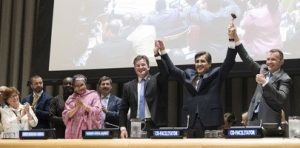 ill be here for centuries more. And this agreement addresses this reality. And it offers a way to deal with it.”
ill be here for centuries more. And this agreement addresses this reality. And it offers a way to deal with it.”
Miroslav Lajčák (center), president of the 72nd session of the General Assembly, and co-facilitators for the Global Compact on Migration process: Juan José Gómez Camacho (second from right), permanent representative of Mexico, and Jürg Lauber (right), permanent representative of Switzerland, hold up the gavel at the end of the meeting.
California
Mark Carlson, Lutheran Office of Public Policy http://loppca.org
LEGISLATIVE UPDATE: Before the Legislature left for its summer “work session” (recess), the Assembly Utilities and Energy Committee passed SB 100, which has a goal of reaching 100 percent carbon-emission free electrical energy by 2045. Celebrating with LOPP-CA Director Mark Carlson (right in photo) were author Sen. Kevin De Léon (center) and representatives from the Friends Committee on Legislation of California, California Interfaith Power & Light and Yolo Interfaith Coalition for Climate Justice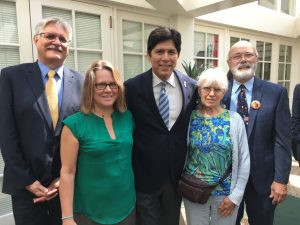 . California is already ahead of the goals set in its Renewable Portfolio Standard.
. California is already ahead of the goals set in its Renewable Portfolio Standard.
LOPP-CA is hosting the August Advocacy Day for California Interfaith Power & Light and will be joined by Jane Affonso for the Green California Lobby Day and Awards Reception on Aug. 8. Jane is a Southwest California Synod Council member, co-chairs its Green Faith Team, and is vice chair of the LOPP-CA Policy Council. On Aug. 7, Jane will join a group from The Belfry, Lutheran Episcopal Campus Ministry at the University of California-Davis, for a Build the Dream Alliance Lobby Day with a focus on bail reform, reform of law enforcement’s use of deadly force (from “reasonable” to “necessary”), and a ban on required employee arbitration, a reform recommended by advocates for those affected by sexual harassment.
BALLOT MEASURES: The Policy Council met July 14 to consider the 10 measures in addition to Propositions 1 and 2 (housing funds, support). It supported returning rent control authority to local governments, currently pre-empted by the state.
Colorado
Peter Severson, Lutheran Advocacy Ministry–Colorado lam-co.org
BALLOT MEASURES: Lutheran Advocacy Ministry-Colorado is participating in two coalitions to support measures for the fall statewide ballot. One is Amendment A, an effort to remove the exception to the ban on slavery in Article II of our state constitution. The language mirrors the 13th Amendment to the U.S. Constitution, where slavery and involuntary servitude are not prohibited for those convicted of a crime. If successful, Colorado would be the first state to remove such language from its constitution.
The second measure is Initiative 126, an effort to cap payday loan interest rates at 36 percent. Currently, Coloradans who take out payday loans end up with rates averaging 129 percent, and in some cases, loan rates exceed 200 percent. This predatory, exploitative practice is condemned in the Bible as usury, and we’ve joined a broad coalition of faith-based and non-religious groups to put this measure on the ballot. To learn more, visit stoppredatorypaydayloans.com.
There will undoubtedly be many more measures on our ballot, some of which we may take a position on. For now, we are excited to be working on these two important issues.
BORDER ADVOCACY: The Rocky Mountain Synod put out the call for emergency support for several border agencies that were set to receive hundreds of migrant families during the week of July 23. Families are trying to reunite in the wake of the federal government’s logistically and morally disastrous “zero tolerance” policy. Thank you to all those who have supported this emergency fund!
North Carolina
GeoRene Jones, North Carolina Synod Social Justice & Advocacy Ministries
#KeepFamiliesTogether: The ELCA in North Carolina offered strong support for #KeepFamiliesTogether events on June 30.
St Mark’s (Asheville), Grace (Hendersonville), Cross & Crown (Matthews), Holy Trinity and Christ Lutheran (Charlotte), Haven and St. John’s (Salisbury), First and Augsburg (Greensboro), Grace and St Philip’s (Raleigh), Christ the King (Cary) Abiding Savior and St Paul’s (Durham), St. Matthew’s (Wilmington) and others across the state rallied, telephoned and emailed legislators in support of immigration and refugee policies that preserve family unity.
Grace (Hendersonville) continues the focus of welcoming the stranger when it jointly hosts “Stranger to Neighbor” presentation(s) of local agencies in their community.
RACISM: ELCA efforts against racism continue as we strive for meaningful inter-congregational relationships. In Charlotte, Holy Trinity (ELCA) and Little Rock (AME-Zion) regularly work shoulder-to-shoulder in outreach. Grace Lutheran and St Paul AME-Zion (Hendersonville) are working together to offer race-relations education, including a potential civil rights bus tour in early 2019.
WILD GOOSE FESTIVAL: Social Justice & Advocacy Ministries joined forces with Lenoir-Rhyne/Lutheran Theological Southern Seminary at the 2018 Wild Goose Festival, July 13-16, in Hot Springs. Festival attendee and presenter, the Rev. Nadia Bolz-Weber, explains, “The Wild Goose is a progressive, justice, music and arts festival; therefore, there is nothing remotely like it in the United States. I mean, this is it!”
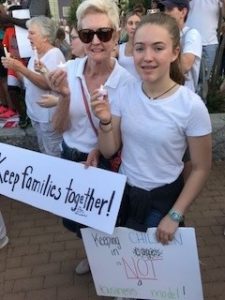
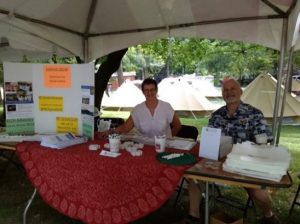
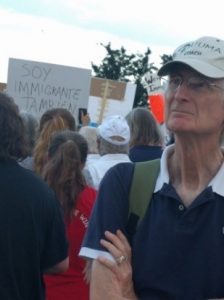
New Mexico
Ruth Hoffman, Lutheran Advocacy Ministry–New Mexico lutheranadvocacynm.org
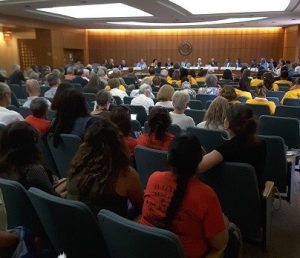
HEARING ON DETAINED IMMIGRANTS: The Legislature’s interim Courts, Corrections and Justice Committee recently held a hearing on immigrants and refugees being held in private prisons or detention centers. The hearing room was packed with immigrants and their families, as well as many people concerned about the detention of migrants. Migrants and their families told many disturbing stories about their experiences while being held in private detention centers. There are two such facilities in New Mexico. LAM-NM Director Ruth Hoffman testified against the privatization of prisons using the ELCA criminal justice social statement.
New Jersey
Sara Lilja, Lutheran Episcopal Advocacy Ministry of New Jersey (LEAMNJ)
SPRING EVENTS AND LEGISLATION: This summer, the Lutheran Episcopal Advocacy Ministry of New Jersey (LEAMNJ) is working primarily on legislative action after a spring filled with educational events. Our spring events included two regional gatherings to learn how to advocate for criminal justice reform and economic justice reform in community; a bus trip with 150 individuals to the March For Our Lives in Washington, D.C., to support the youth-led movement to end gun violence; and the launch of a movement to allow undocumented New Jerseyans to get driver’s licenses. Building off that momentum, we are working hard on two legislative actions: 1) Paid family leave for all New Jersey workers, and 2) Guaranteed $15/hour minimum wage.
1) In March, LEAMNJ co-hosted a lobby day in Trenton, connecting people of faith to legislators on the issue of paid family and sick leave for all New Jerseyans. At the end of that day, the legislation was passed out of the Assembly and was approved by both the Assembly and the Senate. It was a great day of putting faith into action. We anticipate this legislation being signed into law in the fall.
2) There is much support in the Legislature and from the governor for raising the New Jersey minimum wage to $15/hour by 2023. LEAMNJ is mobilizing people of faith to contact elected officials to ensure that all workers (including those working in businesses with tips) are guaranteed that wage when the bill is voted on.
HUNGER ADVOCACY FELLOW: Looking ahead to the fall, LEAMNJ is excited to welcome Erica Earnest as our Hunger Advocacy Fellow for the coming year! Erica recently earned her Master of Divinity from Princeton Theological Seminary and will complete her Master of Social Work from Rutgers in Spring 2019. A big welcome to Erica!
VIDEO: Finally, thanks to a generous grant, LEAMNJ was able to produce a short video to help share our story. That video can be found here.
Pennsylvania
Tracey DePasquale, Lutheran Advocacy–Pennsylvania lutheranadvocacypa.org
ENERGY-STAR STEWARDSHIP TOUR: LAMPa is joining faith-based partners, in conjunction with the EPA, planning a PA Energy-Star Stewardship Tour Sept. 23-24 at multiple locations across the state. Energy Star is the nation’s voluntary program helping congregations, businesses, schools, homeowners and tenants save energy and water – and, therefore, money.
AIR POLLUTION REPORT: LAMPa Director Tracey DePasquale spoke at a Capitol news conference unveiling the report by the Frontier Group, PennEnvironment Research & Policy Center and the Pennsylvania Public Interest Research Group Education Fund, “The air, which is to be life-giving, is for some, death-dealing. And climate change is only going to make this worse.” Read more here.
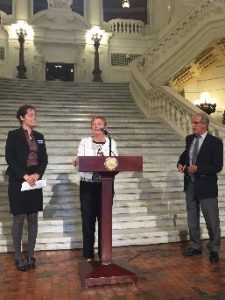
STATE SUPREME COURT RULING: By a decision of 7 to 0, the Supreme Court of Pennsylvania on July 18 found that Act 80 of 2012 was enacted in a manner that violated the Pennsylvania Constitution. Advocates, including LAMPa, opposed the measure that hurt Pennsylvanians living in severe poverty, and Community Legal Services challenged the constitutionality of Act 80 with a lawsuit. Learn more.
“GOD’S WORK. OUR HANDS.” SUNDAY: LAMPa continues to provide resources for “God’s work. Our hands.” Sunday. Take your service to neighbors a step further toward justice through advocacy. Contact us at LAMPa@lutheranadvocacypa.org and put “Sept. 9” in the subject line. We can also put you in touch with congregations that have successfully incorporated advocacy into their day of service.
Southeastern Synod
Hilton Austin, director
IMMIGRATION/DETENTION: On June 30, Southeastern Synod Advocacy was involved in marches all across our four states to protest immigration detention centers and the separation of families. In Atlanta, members of our team joined approximately 10,000 people gathered at the Atlanta Detention Center and marched to the Paul D. Coverdale Legislative Office Building.
ELECTIONS: Currently, it seems everything in both Georgia and Tennessee is focused on the upcoming mid-term elections. Some of our team was involved in a get-out-the-vote campaign for July 24 primary runoff elections.
SYNOD ASSEMBLY: Under the theme “Reformation 500 … Now What?,” the assembly considered who God is calling us to be and what God is calling us to do into the future. Bishop Julian Gordy put it this way:
So be of good cheer, friends. In spite of what you may have heard, these are good days to be the church. Opportunities to be Christ for our neighbors abound in this world in which our neighbors are lonely and disconnected from community, a world in which refugees are turned away from the borders of wealthy nations and hearts are hardened against those looking for asylum, a world in which the poor are losing access to health care and nutrition in the world’s richest nation, a world in which race determines too much how people are treated by the law and by institutions and by you and me, a time in which hateful language in high places is a daily occurrence and sword rattling is ascendant, a time in which those claiming evangelical Christianity lead the chorus of condemnation – in this world, in this Southeast, we can be, we are called to be, “the alternative face of Christianity” … to show the way of God’s love and mercy that are meant for all people.
We had great turnout for our advocacy workshops, “A Voice in the Wilderness,” as we continue to mobilize more Lutherans to take action on social justice issues.
HUNGER ADVOCACY FELLOW: We are excited about the addition of our new Hunger Advocacy Fellow, Kimberly Jordan Slappey. She will begin her year with us on Sept. 4.
Washington
Paul Benz, Faith Action Network fanwa.org
WASHINGTON STATE AND NATIONAL POLICY: At the federal level, we continue to focus on the farm bill, encouraging our network to advocate for the bipartisan Senate version, which will preserve vital Supplemental Nutrition Assistance Program (SNAP) funding. We have August recess meeting requests in for two moderate Republican House members to meet with faith leaders on this issue as well as on immigration issues.
At the state level, we are beginning to form our 2019 legislative agenda via policy meetings with our many partners.
STAFF TRANSITIONS: As we said goodbye to two staff members last month, we welcomed two more! We are excited to have Sarah Vatne (at left on the right) to join us as an ELCA Hunger Fellow and Tara MillerBerry (on the left) as our administrative and development coordinator.
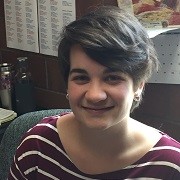
CLUSTER GATHERINGS: Our annual fall Cluster Gatherings are in the process of being scheduled. These are 21 small group meetings held across the state every fall to gather our members and friends together to hear what is going on in their faith communities and to strategize about how to work together more effectively.
CANDIDATE FORUMS: FAN held three pre-primary (Aug. 7) candidate forums covering four legislative districts. One was hosted by one of our Jewish faith partners in which we were the prime sponsors and brought in 90 attendees to hear from five candidates. We look forward to providing more of these opportunities in the fall.
Wisconsin
Cindy Crane, Lutheran Office for Public Policy in Wisconsin loppw.org
HUNGER, THE FARM BILL, IMMIGRATION AND THE ELCA: About 55 people attended an event LOPPW organized with hunger volunteers Cindy Dobberke and Molly Riehle of the Greater Milwaukee Synod. We included tips on advocacy, information for advocating on the farm bill and letters on immigration for people to sign. Panelists on immigration included AMMPARO Director Mary Campbell, Bishop Paul Erickson, Faith Santa Fe Lutheran Church’s Pastor Richard Suero and his parishioners, the Hernandez siblings, whose mother was almost deported.
AUGUST ACTION: LOPPW’s director, council members and other volunteers are working to get appointments with all of Wisconsin’s members of Congress and the Upper Peninsula of Michigan to discuss the farm bill and immigration in August while our representatives are in district.
Planning:
- Oct. 6: Care for God’s Creation Conference
- Nov. 3–4 or 5: Hungry for Change Overnight Lutheran Campus Ministry Retreat for all campus ministries in Wisconsin and the UP, planned by LOPPW and campus ministries in Madison and Milwaukee, to be held in Milwaukee. The focus will be on hunger and will include visits to organizations making a difference with hunger and discussions about advocacy.
- ELCAvotes: Along with a full-time hunger fellow, LOPPW will have an intern via a program developed by Madison Campus Ministry for 10 hours per week. Sarah Schultz has not officially begun but would like to focus on getting students out to vote and sat in on a D.C. office-initiated conference call on ELCAvotes.



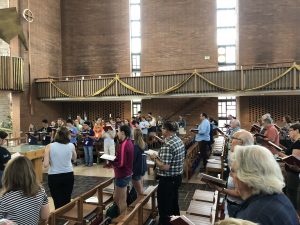 University in Valparaiso, Indiana. This continuing education event was a joint venture between the
University in Valparaiso, Indiana. This continuing education event was a joint venture between the 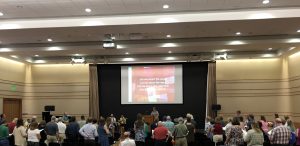 The group learning sessions were very informative and helpful. My church offers contemporary worship services so I found the inclusion of sessions related to presenting music in that type of setting to be a great addition. Throughout the event, participants were given access to a wide variety of materials and resources related to music leadership and worship planning. There were several that were of interest to me, such as the
The group learning sessions were very informative and helpful. My church offers contemporary worship services so I found the inclusion of sessions related to presenting music in that type of setting to be a great addition. Throughout the event, participants were given access to a wide variety of materials and resources related to music leadership and worship planning. There were several that were of interest to me, such as the 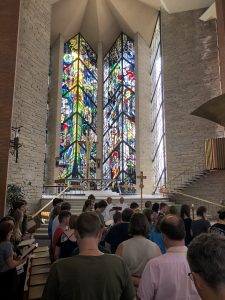 Another conference? Having served churches as a Minister of Music for more than forty years, what could this event offer other than a break from the day-to-day routine of church work and an opportunity to meet or reconnect with colleagues? From my first step into the Chapel of Resurrection at Valparaiso University, the answer was that this was going to be an exceptional experience. The concurrent programming of this ALCM event with the last week of the Lutheran Summer Music program united the hearts, hands, and voices of several generations of musicians. From the opening Eucharist, through Morning Prayer, Night Prayer, and the hymn festival, these LSM students lifted our worship to new heights as we together praised God through the gift of music.
Another conference? Having served churches as a Minister of Music for more than forty years, what could this event offer other than a break from the day-to-day routine of church work and an opportunity to meet or reconnect with colleagues? From my first step into the Chapel of Resurrection at Valparaiso University, the answer was that this was going to be an exceptional experience. The concurrent programming of this ALCM event with the last week of the Lutheran Summer Music program united the hearts, hands, and voices of several generations of musicians. From the opening Eucharist, through Morning Prayer, Night Prayer, and the hymn festival, these LSM students lifted our worship to new heights as we together praised God through the gift of music.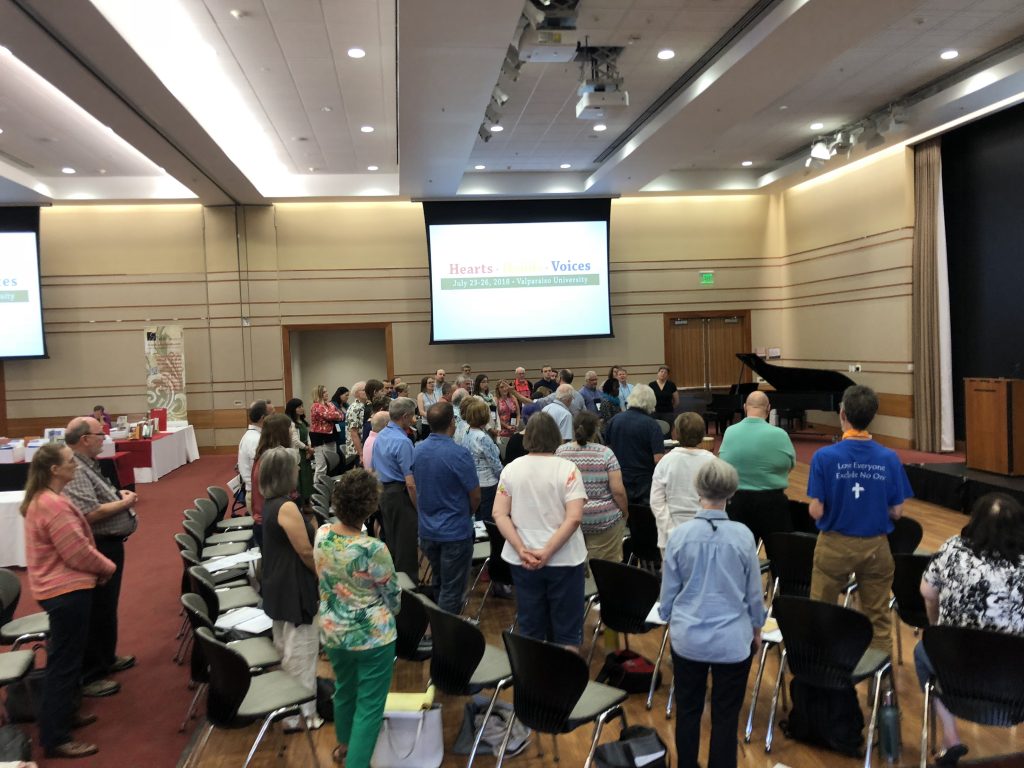
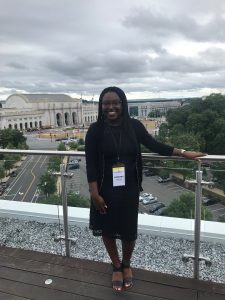












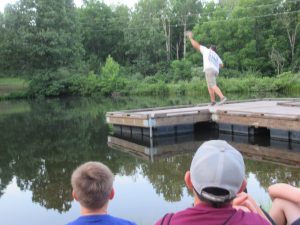
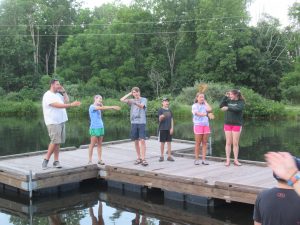
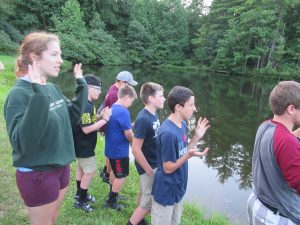 It has been my experience that a camp worship service can be very powerful. But as I write this, describing these worship experiences, I recall the words of one of my predecessors here at Mount Luther. Early in my tenure as director, I sat in the kitchen of Don and Betty Mincemoyer who served here in the 1960s. They related the camp mission to their staff in this way: “Every thought a prayer; every action a worship experience.” Having the chance to give expression to what the whole creation yearns to do—praising God from whom all blessings flow—is what we continually do every day as we swim, make crafts, eat meals, hike, and play games. Camp is a place where we continually make our thoughts a prayer and our actions a worship experience. And because of that worship, both on our lakeshores and in other spots of God’s creation, lives are changed as Jesus Christ is encountered in new and exciting ways.
It has been my experience that a camp worship service can be very powerful. But as I write this, describing these worship experiences, I recall the words of one of my predecessors here at Mount Luther. Early in my tenure as director, I sat in the kitchen of Don and Betty Mincemoyer who served here in the 1960s. They related the camp mission to their staff in this way: “Every thought a prayer; every action a worship experience.” Having the chance to give expression to what the whole creation yearns to do—praising God from whom all blessings flow—is what we continually do every day as we swim, make crafts, eat meals, hike, and play games. Camp is a place where we continually make our thoughts a prayer and our actions a worship experience. And because of that worship, both on our lakeshores and in other spots of God’s creation, lives are changed as Jesus Christ is encountered in new and exciting ways.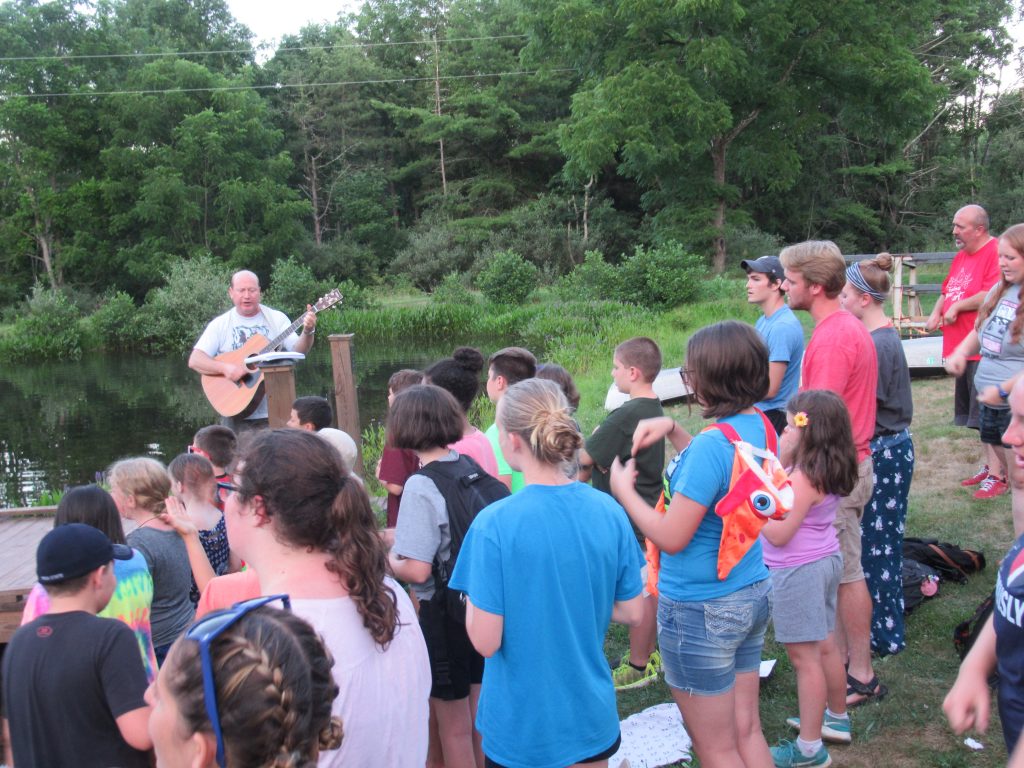
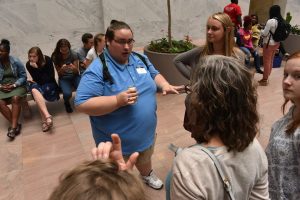
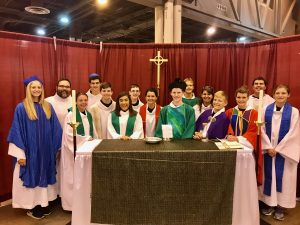 Sy Shipman (back row, third from left) worships at St. John Lutheran Church (Windfall) in Cardington, Ohio.
Sy Shipman (back row, third from left) worships at St. John Lutheran Church (Windfall) in Cardington, Ohio.